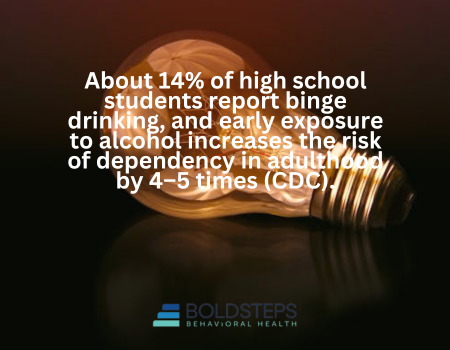Alcohol dependency, also known as alcohol use disorder (AUD), is a condition that affects millions of individuals and their families worldwide. While the physical toll of excessive alcohol use is often discussed, the hidden dangers—such as its impact on mental health, relationships, and overall quality of life—are frequently overlooked. These less visible consequences can be just as devastating as the physical effects, making professional treatment essential for long-term recovery.
At Bold Steps Behavioral Health, we provide a range of evidence-based treatment options, including our Alcohol Addiction Treatment Program, Partial Hospitalization Program, and Virtual Treatment Program, designed to help individuals regain control of their lives and achieve lasting sobriety. This comprehensive guide explores the often-hidden dangers of alcohol dependency and why seeking professional treatment is a critical step toward recovery.
Understanding Alcohol Dependency
Alcohol dependency is a chronic condition characterized by an inability to control drinking despite harmful consequences. Over time, the body develops a tolerance to alcohol, requiring larger amounts to achieve the same effects. This dependence leads to withdrawal symptoms when alcohol use is reduced or stopped.
Key Signs of Alcohol Dependency
- Drinking more or for longer periods than intended.
- Experiencing strong cravings for alcohol.
- Neglecting responsibilities at work, school, or home due to drinking.
- Developing a tolerance, requiring more alcohol to feel its effects.
- Experiencing withdrawal symptoms such as anxiety, sweating, or nausea when not drinking.
- Continuing to drink despite negative impacts on health, relationships, or finances.
Recognizing these signs is the first step toward addressing the problem. If you or a loved one is struggling with alcohol dependency, seeking help through an Alcohol Addiction Treatment Program is essential.
The Hidden Dangers of Alcohol Dependency
The consequences of alcohol dependency extend far beyond visible physical symptoms. These hidden dangers can undermine every aspect of life, from mental health to personal relationships.
1. Physical Health Risks
Alcohol dependency takes a serious toll on the body, often leading to chronic and life-threatening conditions.
Liver Damage
The liver is responsible for processing alcohol, but excessive drinking can overwhelm it, resulting in:
- Fatty Liver Disease: A buildup of fat in the liver that can lead to inflammation.
- Alcoholic Hepatitis: Liver inflammation caused by excessive drinking.
- Cirrhosis: Permanent scarring of the liver that impairs its function.
Heart and Cardiovascular Issues
Chronic alcohol use is linked to:
- High blood pressure.
- Irregular heart rhythms (arrhythmias).
- Cardiomyopathy, a condition where the heart muscle weakens.
Immune System Suppression
Alcohol weakens the immune system, making individuals more susceptible to infections and illnesses.
Increased Cancer Risk
Alcohol is classified as a carcinogen and is associated with cancers of the:
- Mouth and throat.
- Esophagus.
- Liver.
- Breast.
2. Mental Health Challenges
The impact of alcohol dependency on mental health is profound and often underestimated.
Co-Occurring Disorders
- Alcohol dependency frequently coexists with mental health conditions such as depression, anxiety, and PTSD.
- Nearly 1 in 5 individuals with alcohol use disorder also has a co-occurring mental health disorder (SAMHSA).
Cognitive Decline
- Prolonged alcohol use can impair memory, decision-making, and problem-solving skills.
- Heavy drinking is linked to an increased risk of developing dementia and other neurocognitive disorders.
Emotional Instability
- Alcohol often exacerbates emotional problems, leading to irritability, mood swings, and feelings of hopelessness.
3. Social and Relationship Struggles
Alcohol dependency doesn’t just affect the individual—it impacts their entire support network.
Family Dynamics
- Alcohol misuse can lead to strained relationships, broken trust, and conflict within families.
- Children of individuals with alcohol dependency are at a higher risk for emotional and behavioral problems.
Workplace Challenges
- Alcohol dependency often results in decreased productivity, absenteeism, and job loss.
Social Isolation
- Individuals may withdraw from social activities, prioritizing alcohol over meaningful connections.
Why Professional Treatment is Crucial
The hidden dangers of alcohol dependency highlight the importance of seeking professional treatment. Recovery is not simply about quitting alcohol—it involves addressing the underlying causes of dependency and equipping individuals with the tools needed for a sustainable, alcohol-free life.
Comprehensive Care Through Professional Treatment
1. Safe Detoxification
Withdrawal from alcohol can be dangerous, especially for those with severe dependency. A Medical Detox Program provides:
- 24/7 medical supervision to manage withdrawal symptoms like seizures or delirium tremens (DTs).
- Medications to reduce discomfort and prevent complications.
2. Personalized Treatment Plans
At Bold Steps Behavioral Health, we understand that every individual’s journey is unique. Our programs include:
- Partial Hospitalization Program (PHP): A structured, intensive program combining therapy, medical care, and relapse prevention strategies.
- Intensive Outpatient Programs (IOP): Flexible care that allows individuals to balance recovery with daily responsibilities.
- Outpatient Treatment Program: Ongoing support for individuals in the later stages of recovery.
- Virtual Treatment Program: Convenient online access to therapy and counseling for those unable to attend in-person sessions.
3. Dual Diagnosis Care
Integrated Behavioral Health Treatment in New Hampshire addresses co-occurring mental health conditions alongside alcohol dependency. This holistic approach ensures that individuals receive comprehensive care for both their physical and emotional well-being.
4. Relapse Prevention and Aftercare
Long-term recovery requires ongoing support and a strong relapse prevention plan. Professional treatment provides:
- Tools to identify and manage triggers.
- Access to peer support groups like Alcoholics Anonymous (AA).
- Continued therapy to reinforce coping strategies and maintain progress.
Treatment Options at Bold Steps Behavioral Health
At Bold Steps Behavioral Health, we offer a full continuum of care to support individuals at every stage of recovery. Our programs include:
Medical Detox Program
Detox is the first step in recovery, providing a safe environment for individuals to manage withdrawal symptoms with medical support.
Partial Hospitalization Program (PHP)
Our PHP offers structured, intensive care during the day, allowing individuals to return home at night.
Intensive Outpatient Programs (IOP)
Our IOP combines flexibility with structured therapy, making it ideal for individuals balancing recovery with work or family obligations.
Outpatient Treatment Program
Our Outpatient Treatment Program provides ongoing support through regular counseling and access to community resources.
Virtual Treatment Program
For those seeking convenience and privacy, our Virtual Treatment Program offers high-quality care from the comfort of home.
Why Choose Bold Steps Behavioral Health?
At Bold Steps Behavioral Health, we are committed to helping individuals overcome alcohol dependency through compassionate, evidence-based care. Here’s what sets us apart:
1. Individualized Care
We create personalized treatment plans tailored to your unique needs and recovery goals.
2. Comprehensive Services
From detox to outpatient care, we provide a full range of services to support long-term recovery.
3. Expert Team
Our licensed therapists, medical professionals, and addiction specialists have extensive experience in addiction treatment and mental health care.
4. Flexible Options
Our in-person and virtual programs ensure that everyone can access the care they need, no matter their circumstances.
Conclusion
The hidden dangers of alcohol dependency extend far beyond physical health, impacting every aspect of life. However, recovery is possible with the right support and professional care. At Bold Steps Behavioral Health, we provide the tools, resources, and compassionate guidance necessary to help individuals achieve lasting sobriety.
Take the first step today. Call us at (603) 915-4223 or visit Bold Steps Behavioral Health to learn more about our programs, including our Alcohol Addiction Treatment Program, Partial Hospitalization Program, and Virtual Treatment Program. Together, we can help you build a healthier, alcohol-free future.
FAQ on Hidden Dangers of Alcohol Dependency
What are the hidden dangers of alcohol dependency?
Alcohol dependency can lead to serious physical, mental, and social consequences, including:
- Liver damage (e.g., cirrhosis).
- Increased risk of cancer and heart disease.
- Mental health issues like anxiety, depression, and cognitive decline.
- Strained relationships, job loss, and social isolation.
What are the signs of alcohol dependency?
Common signs include:
- Drinking more or for longer than intended.
- Cravings for alcohol or inability to quit drinking.
- Experiencing withdrawal symptoms such as nausea, sweating, or irritability.
- Neglecting responsibilities at work, school, or home.
Why is professional treatment necessary for alcohol dependency?
Professional treatment provides a structured approach to recovery, including:
- Medical Detox Program for safe withdrawal.
- Therapy to address underlying causes of addiction.
- Tools and support for long-term sobriety.
- Integrated care for co-occurring mental health disorders.
What treatment options does Bold Steps Behavioral Health offer?
We offer a variety of programs tailored to individual needs, including:
- Alcohol Addiction Treatment Program
- Partial Hospitalization Program (PHP)
- Intensive Outpatient Programs (IOP)
- Outpatient Treatment Program
- Virtual Treatment Program
Can alcohol dependency be treated alongside mental health issues?
Yes, at Bold Steps Behavioral Health, we provide Behavioral Health Treatment in New Hampshire to address both addiction and co-occurring mental health disorders, such as anxiety, depression, and PTSD.
How can family and friends support someone in recovery?
Family and friends can support recovery by:
- Encouraging professional treatment.
- Participating in family therapy sessions.
- Providing a supportive and non-judgmental environment.
- Educating themselves about alcohol dependency and recovery.



